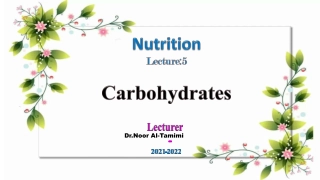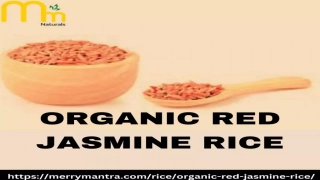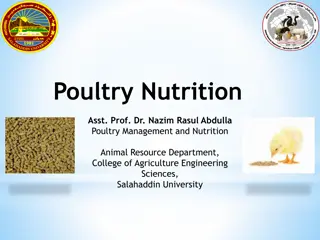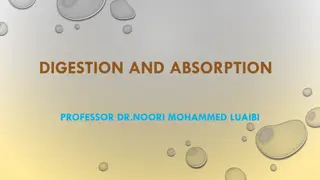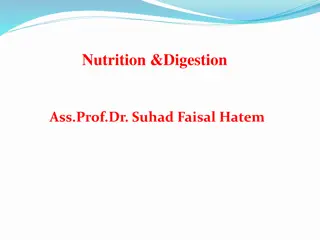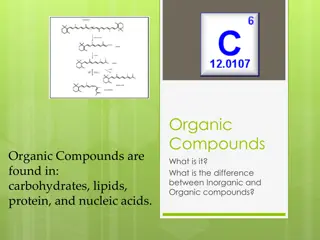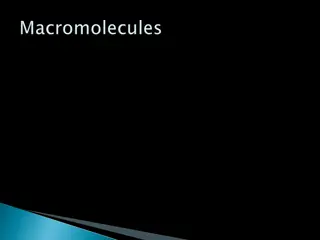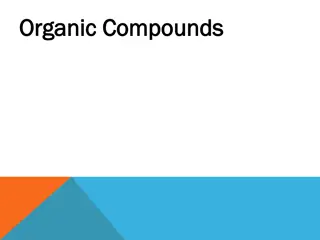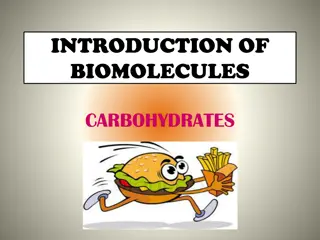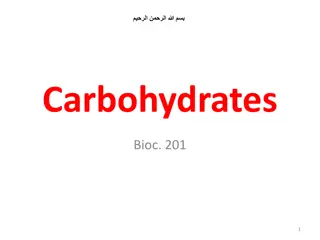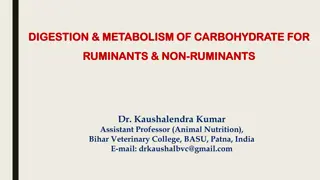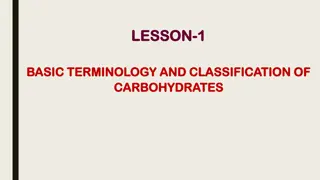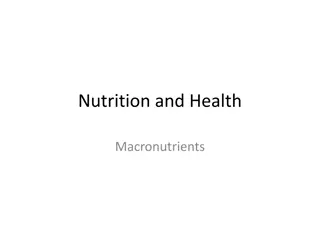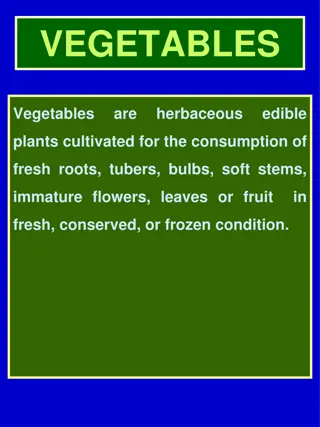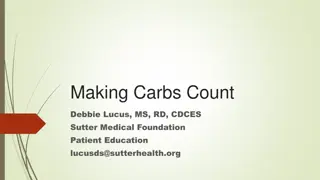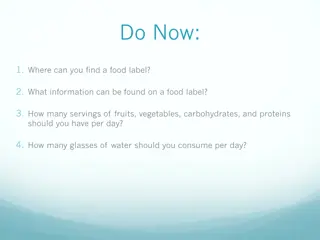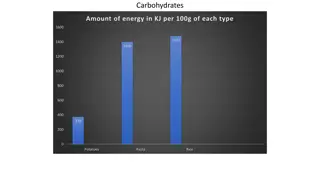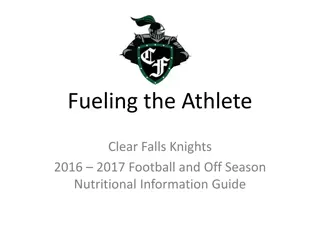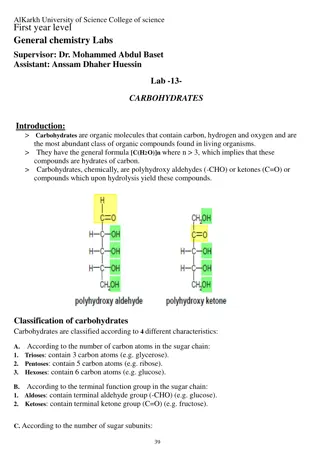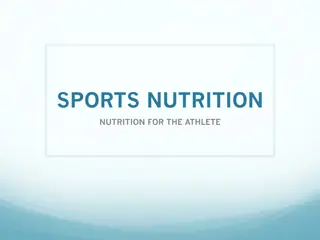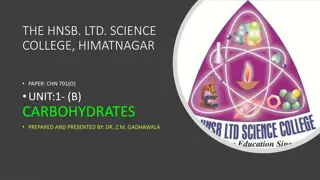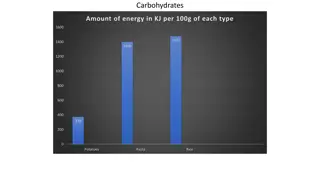Carbohydrates
The functions, sources, storage, and utilization of carbohydrates, as well as the recommended daily intake and health implications of carbohydrate deficiency.
1 views • 18 slides
Buy Organic Red Jasmine Rice Online
Nutritionally, organic red jasmine rice is a wholesome choice, providing essential nutrients such as carbohydrates for energy, fiber for digestive health, and a range of vitamins and minerals including iron and B vitamins. Its low glycemic index makes it a favorable option for those seeking to manag
3 views • 9 slides
Buy Organic Red Jasmine Rice Online
Nutritionally, organic red jasmine rice is a wholesome choice, providing essential nutrients such as carbohydrates for energy, fiber for digestive health, and a range of vitamins and minerals including iron and B vitamins. Its low glycemic index makes it a favorable option for those seeking to manag
5 views • 9 slides
Pita Pocket Whole Wheat By BestPita.Com
It's essential to be mindful of your food choices when embarking on a weight-loss journey. ? Choosing nutrient-dense options over calorie-dense ones can make a significant difference. Unfortunately, foods like bread , pasta , pizza , and pastries are often high in refined carbohydrates and calories
2 views • 12 slides
Kitchen Safety, Nutrition, and Food Handling Guidelines
Explore essential topics such as food handling practices, kitchen safety rules, basic nutrition insights, and tools for culinary workshops. Discover the importance of proper utensil use, accident prevention in the kitchen, and the impact of malnutrition on health. Learn about the food pyramid, foods
2 views • 19 slides
Poultry Nutrition
Developments in poultry nutrition have led to increased productivity in the industry over the past 20 years. The focus is shifting towards life-cycle feeding programs for different bird classes rather than individual diets. Poultry diets consist of various feedstuffs providing essential nutrients fo
2 views • 33 slides
Understanding Osazone Test: A Chemical Test for Detecting Reducing Sugars
The Osazone test is a chemical test used to detect reducing sugars by forming derivatives of carbohydrates with phenyl hydrazine. This test helps in distinguishing different reducing sugars and differentiating between reducing and non-reducing sugars. The principle involves the reaction between carb
11 views • 22 slides
Understanding Digestion and Absorption in the Gastrointestinal Tract
Digestion and absorption in the gastrointestinal tract are crucial processes for breaking down carbohydrates, fats, and proteins into smaller compounds that can be absorbed by the body. Carbohydrates undergo hydrolysis to convert into monosaccharides, fats are broken down from triglycerides, and pro
1 views • 22 slides
Understanding Nutrition and Digestion for Optimal Health
Nutrients obtained from the environment are essential for growth, repair, and regulation in organisms. Macronutrients like carbohydrates, lipids, proteins, and water are needed in larger amounts, while micronutrients such as vitamins and minerals are required in smaller quantities. Carbohydrates ser
0 views • 22 slides
Understanding Organic Compounds and Their Importance in Daily Life
Explore the world of organic compounds, including their definition, difference from inorganic compounds, common elements found in them, and the significance of hydrocarbons. Learn about the essential role of organic compounds in living organisms, such as proteins, carbohydrates, and fats, and how th
1 views • 51 slides
Understanding Carbohydrates in Living Organisms
Carbohydrates, along with proteins, lipids, and nucleic acids, are essential macromolecules in living organisms. They are made up of carbon, hydrogen, and oxygen in a 1:2:1 ratio. Carbohydrates provide the main energy source for living things, with examples including glucose, fructose, and sucrose.
0 views • 58 slides
Carbohydrate Color Tests Experiment Summary
This experiment explores color tests for carbohydrates, specifically the Molisch and Anthrone tests. The Molisch test is a general test for carbohydrates using concentrated sulfuric acid, while the Anthrone test involves the formation of a blue-green complex with carbohydrates. The presence of a pur
0 views • 13 slides
Carbohydrate Color Tests Experiment Summary with Molisch and Anthrone Methods
This experiment demonstrates general color tests for carbohydrates using the Molisch and Anthrone methods. The Molisch test is effective for various carbohydrates, producing a purple ring upon positive reaction with concentrated sulfuric acid and -Naphthol. The presence or absence of carbohydrates c
2 views • 13 slides
Understanding the Nutritive Value and Caloric Content of Ice Cream in Dairy Technology
Ice cream, a favorite treat, offers a rich source of food energy and nutrients due to its ingredients like fat, carbohydrates, proteins, and added flavors. The caloric value of ice cream can be calculated based on the percentages of these components. Furthermore, ice cream provides vitamins, fats, p
0 views • 19 slides
Understanding Organic Compounds, Carbohydrates, and Elements
Explore the chemical composition of organic compounds, the role of complex carbohydrates in providing energy to the body, and the significance of elements as the fundamental building blocks of all matter. Discover how enzymes in saliva break down carbohydrates, the importance of complex carbohydrate
0 views • 12 slides
Understanding Qualitative Tests of Carbohydrates
Carbohydrates are vital sources of energy in living organisms and play a significant role in cell structures. This article covers the classification of carbohydrates, including monosaccharides and polysaccharides, and explores their solubility properties. It also delves into the distinction between
0 views • 22 slides
Understanding Special Stains in Pathology
Special stains in pathology provide crucial diagnostic information beyond routine stains like H&E. They help highlight specific tissue components like carbohydrates, amyloid, nucleic acids, lipids, microorganisms, connective tissues, pigments, and minerals. This article delves into the classificatio
0 views • 19 slides
Understanding Carbohydrates: The Essential Biomolecules in Nature
Biomolecules are vital molecules found in all living organisms, primarily composed of carbon along with other elements like hydrogen, oxygen, and nitrogen. Carbohydrates, the most abundant organic molecules in nature, are important sources of energy and serve as structural precursors for various com
0 views • 15 slides
Understanding Carbohydrates: Essential Organic Molecules in Nature
Carbohydrates, also known as saccharides, are crucial organic compounds that serve various functions in living organisms. They are a major energy source, play a role in energy storage, contribute to cell structure, and are essential components of DNA and RNA. Carbohydrates are classified into four g
0 views • 80 slides
Carbohydrate Digestion and Metabolism in Ruminants and Non-Ruminants
Digestion and absorption of carbohydrates play a crucial role in the overall metabolism of ruminants and non-ruminants. This process involves various enzymes like amylase, maltase, lactase, and sucrase that break down complex carbohydrates into simpler forms for absorption in the small intestine. Ru
0 views • 17 slides
Understanding Basic Terminology and Classification of Carbohydrates
This lesson covers the fundamental terminology and classification of carbohydrates, including monosaccharides, oligosaccharides, and polysaccharides. Carbohydrates are essential chemical compounds comprising carbon, hydrogen, and oxygen, with diverse classifications based on their structure and comp
0 views • 37 slides
Understanding Macronutrients: Carbohydrates, Sugar, Proteins, Fats
Explore the essential macronutrients including carbohydrates, sugar, proteins, and fats. Learn about their functions, types, food sources, and impact on health. Understand the role of sugar in energy provision and potential health risks. Discover the importance of starch as a common carbohydrate in
0 views • 59 slides
Comprehensive Guide to Nutritional Value and Composition of Vegetables
Vegetables are herbaceous edible plants cultivated for consumption in various forms like fresh, cooked, or as salads. They are rich in essential nutrients such as protein, carbohydrates, vitamins, and inorganic salts. The tables provided detail the main nutrient constituents and composition of vario
1 views • 25 slides
Understanding Carbohydrates: A Comprehensive Guide to Making Them Count
Explore the world of carbohydrates with Debbie Lucus, MS, RD, CDCES, as she dives into the importance of carbs, which foods are rich in carbs, the benefits of whole grains, and the role of fiber in a balanced diet. Discover tips on incorporating healthy carbohydrates into your meals and optimizing y
0 views • 24 slides
Understanding Food Labels and Nutritional Information
Learn where to find food labels, what information they contain, recommended daily servings of fruits, vegetables, carbohydrates, and proteins, as well as the importance of water intake. Discover the classes of nutrients, serving size details, and guidelines for carbohydrates, proteins, fats, fiber,
0 views • 10 slides
Nutritional Comparison of Carbohydrates, Proteins, Fats, and Vegetables
This infographic presents the energy content in kilojoules (KJ) per 100g of different food types, including carbohydrates (potatoes, pasta, rice), proteins (shrimp, lamb, bacon), fats (olive oil, avocado, peanut butter), and vegetables (broccoli, red peppers, carrot). The data depicts the varying en
0 views • 5 slides
Understanding Macromolecules and Energy from Food
Explore the world of macromolecules, including carbohydrates, lipids, proteins, and nucleic acids, and learn how these large molecules are formed from smaller units. Discover the role of carbohydrates in providing energy, digestion, and absorption, and delve into the different types of carbohydrates
0 views • 9 slides
Essential Nutrition Guide for Athletes: Fueling the Clear Falls Knights
Understand the importance of sports nutrition for athletes, focusing on carbohydrates, protein, and fats. Learn about the best food choices to enhance performance, hydration, recovery, and body composition changes while preventing fatigue. Explore detailed information on carbohydrates, including typ
0 views • 28 slides
Understanding Macromolecules in Forensics and Biology
All living organisms contain essential organic macromolecules - lipids, proteins, carbohydrates, and nucleic acids - composed of carbon, hydrogen, oxygen, and other elements. These macromolecules serve vital functions in cellular processes and structure, with carbohydrates providing energy sources a
0 views • 19 slides
Understanding Carbohydrates: Composition, Structure, and Function
Carbohydrates are composed of carbon, hydrogen, and oxygen in a specific ratio. Monosaccharides such as glucose, fructose, and galactose are carbohydrate monomers, while polysaccharides like lactose, sucrose, starch, cellulose, and glycogen are carbohydrate polymers. The chemical formula for glucose
0 views • 8 slides
Understanding Carbohydrates: A Comprehensive Overview
Carbohydrates are essential organic compounds found abundantly in living organisms, containing carbon, hydrogen, and oxygen. This summary delves into the classification of carbohydrates based on characteristics like the number of carbon atoms, terminal function groups, and the number of sugar subuni
0 views • 5 slides
Understanding the Role of Carbohydrates in Sports Nutrition
Sports nutrition for athletes depends on additional energy expenditures specific to their sport. Carbohydrates, the body's primary energy source, can be found in grains, fruits, vegetables, beans, and dairy products. Athletes need to consume 55-60% of their daily calories from carbohydrates, with co
0 views • 26 slides
Understanding Carbohydrates in Science: Structure, Types, and Applications
Explore the comprehensive study of carbohydrates, including their types such as monosaccharides, disaccharides, and polysaccharides. Learn about the molecular structure and functions of cellulose, starch, and other key carbohydrates. Delve into the chemistry of sugars, nucleic acids, and protein syn
0 views • 32 slides
Understanding Carbohydrates: The Fuel for Your Body
Carbohydrates are essential for providing fuel and energy for daily activities. Glucose, the primary source of energy, is derived from healthy dietary carbs like fruits, vegetables, grains, and beans. By understanding the types of carbohydrates - simple and complex - and their sources, you can optim
0 views • 18 slides
Understanding Carbohydrates and Lipids in Macromolecules
Explore the world of carbohydrates and lipids, essential macromolecules in chemistry. Carbohydrates provide energy and are found in foods like fruits, bread, and pasta, while lipids like fats play a crucial role in storing excess energy. Discover the types of carbohydrates, digestion processes, and
0 views • 16 slides
Understanding Nutritional Requirements for a Balanced Diet
Nutrition is essential for energy production, growth, and body building. Nutrients like carbohydrates, fats, proteins, vitamins, and minerals play crucial roles. Carbohydrates provide energy, proteins are vital for body building, and a balanced diet is necessary for healthy growth. Animal and plant
0 views • 13 slides
Understanding Macromolecules and Essential Nutrients for Overall Well-being
Learn about the main types of macromolecules - Carbohydrates, Lipids, Proteins, and Nucleic Acids - and how they contribute to our health. Explore the importance of essential nutrients available in everyday foods for growth and overall well-being, including carbohydrates, fats, proteins, vitamins, a
0 views • 31 slides
Understanding Carbohydrates: Qualitative Tests and Classification
Carbohydrates serve as a crucial energy source and structural element in living organisms. This lab explores the qualitative tests and classification of carbohydrates, including monosaccharides, disaccharides, oligosaccharides, and polysaccharides. Learn about the properties and distinctions of diff
0 views • 13 slides
Qualitative Tests of Carbohydrates in Biochemistry Lab
The lab features qualitative tests for identifying different types of carbohydrates such as pentose and hexose monosaccharides. Tests include Bial's test to distinguish between sugar types, Seliwanoff's test for aldoses and ketoses differentiation, and Iodine test for polysaccharide detection. Each
0 views • 9 slides
Nutritional Comparison of Carbohydrates, Proteins, Fats, and Vegetables per 100g
Explore the energy content in KJ per 100g of various food types such as potatoes, shrimp, olive oil, broccoli, and more. Compare carbohydrates, proteins, fats, and vegetables to make informed dietary choices. Visual representations included for easy understanding.
0 views • 5 slides
